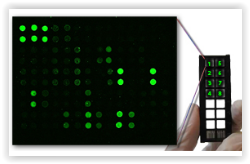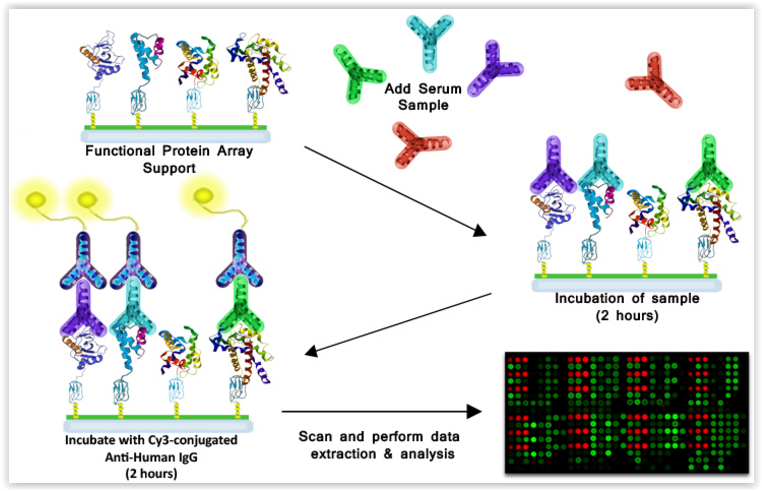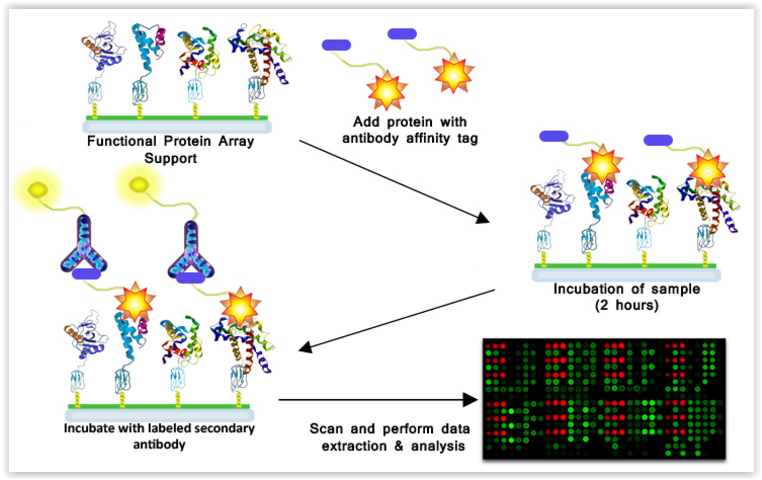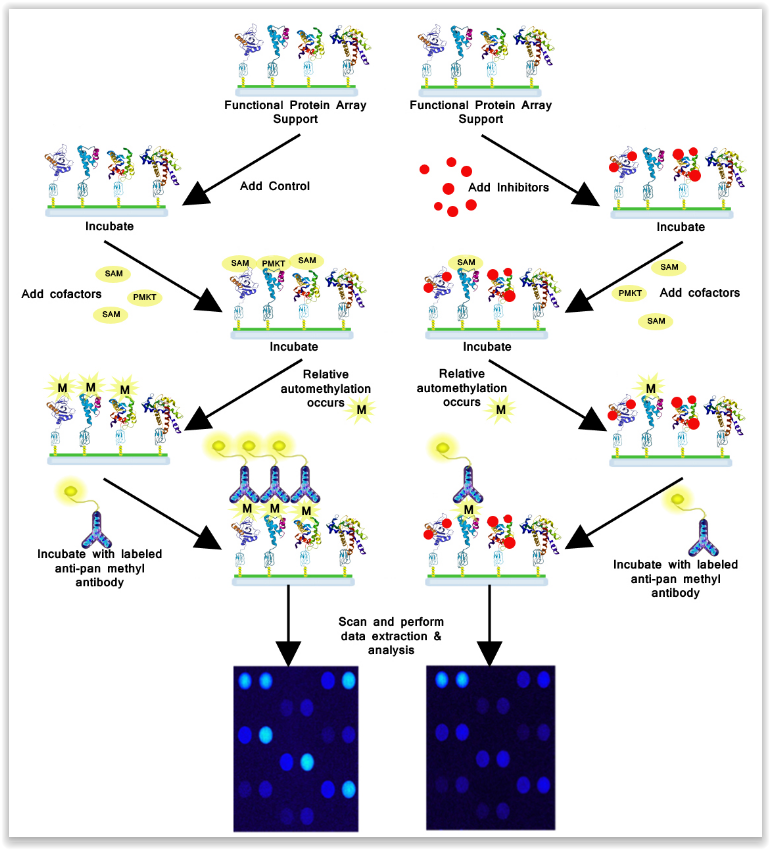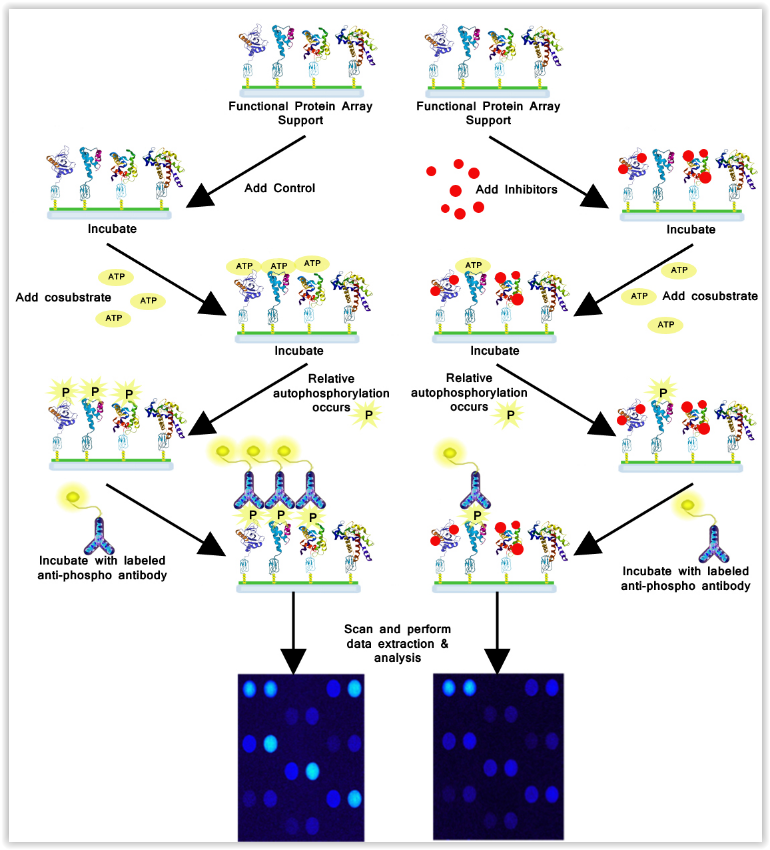Protein arrays enable the analysis of the biological function / activity of dozens to hundreds of proteins in one experiment (e.g. auto-antibody detection, protein-protein interactions, small molecule screening…). In this post, let’s review the recent Raybiotech Protein Arrays focusing on Immunology.
RayBio® Protein Arrays are versatile and innovative planar arrays featuring proteins immobilized onto a glass slide support while targeting specific domains (e.g. Mouse or Human Cytokine Arrays, Allergen Arrays, Lung Cancer IgA Autoantibody Arrays). Such planar Protein Arrays are powerful tools that give a much broader view of the protein biology since they are compatible with multiple experimental applications.
This is particularly true with RayBio’s new, versatile Immunome Protein Arrays that integrate a unique technology to guarantee both specificity of recombinant proteins spotted on the array and full activity of a correctly folded protein.
RayBio® Immunome Protein Array overview
The Immunome Protein Arrays feature 1,631 functional and correctly folded recombinant proteins spotted on a glass slide (quadruplicate with 4 identical subarrays). They are compatible with multiple experimental applications such as:
- Protein-Antibody & Protein-Protein interactions
- Small molecule kinase inhibitor screening
- Methylation studies
- DNA binding studies…
Interestingly, the principle and use are quite simple and require less than 8 hours of processing time. The protocol might slightly differ depending on your preferred application.
For studying Protein-Antibody interactions, the glass slide is probed with less than 25µl of the sample of interest. The nonspecific auto-antibodies are washed off before the incubation with a Cy3 labelled anti-human IgG detection antibodies.
For the identification of Protein-Protein interactions, the protocol requires first to prepare tagged protein samples. They will be probed onto the array and protein-protein complexes will be detected with a fluorescent-conjugated anti-tag detection antibodies.
Regarding Kinase inhibitor screening, the small molecules of interest and controls are incubated directly onto the array (after a washing step) followed by an incubation with co-substrates to induce auto-phosphorylation of kinases. Fluorescent anti-phospho antibodies are then added to interact with the newly phosphorylated kinases. For methylation studies, the principle is quite the same except that the co-factors used will induce protein methylation and the detection is ensured with fluorophore-conjugated secondary antibodies detecting the appropriate post-translation modification.
Finally, regarding DNA binding studies, the array is incubated with the DNA sample of interest and then with a fluorophore-conjugated polyclonal secondary antibodies specific for the DNA sequence of interest.

Whatever your experimental application, the signals are visualized using a fluorescence laser scanner (see laser scanner specifications). Interestingly, if you do not have access to a scanner, RayBiotech and tebu-bio can provide slide scanning and data analysis services.

Interested in RayBio® Protein arrays?
The RayBio® Arrays are semi-quantitative multiplex protein immunoassays, especially developed for the better understanding of the protein biology. They are available as ready-to-use assay kits or as full testing services.
For any further information, leave your questions or comments in the form below – we’ll be pleased to reply!
[contact-form to=’nathalie.bervas@tebu-bio.com’ subject=’RayBio® Protein Arrays and testing services’][contact-field label=’Name’ type=’name’ required=’1’/][contact-field label=’Email’ type=’email’ required=’1’/][contact-field label=’Comment’ type=’textarea’ required=’1’/][/contact-form]
